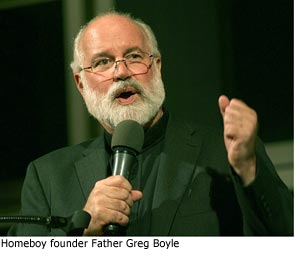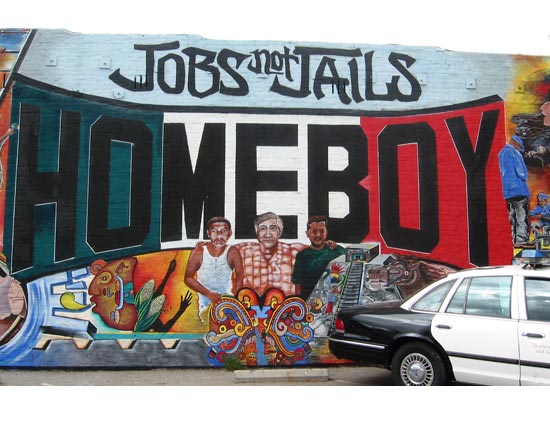Homeboy gets an intervention
September 14, 2010
The famed Homeboy Industries—dedicated to giving gang members an alternative to street life—has been given a helping hand to navigate its own future.
The Board of Supervisors on Tuesday approved a $1.3 million contract with the financially ailing Homeboy Industries to provide job training, counseling and tattoo removal for gang members seeking new lives. Earlier this year, faced with a $5 million shortfall, Homeboy was forced to layoff hundreds of staffers.
“This will be an enormous help,” said Father Greg Boyle, the Jesuit priest who founded Homeboy Industries, the nation’s largest gang-intervention program. “It helps us keep the doors open and continue to offer hope.”
In May, Boyle was forced to slash staffing from 427 to about 100 because of a crippling money crunch brought on by the recession, an expanding clientele and the organization’s costly expansion in 2007 to a new Chinatown headquarters.
Despite the cutbacks, Boyle kept open Homeboy’s bakery, café and other businesses. But he was forced to call on volunteers to perform services crucial to the program’s broader mission, such as counseling, mental health assistance and tattoo removal.
Founded in 1992 in Boyle Heights, Homeboy Industries’ slogan is: “Nothing stops a bullet like a job.” The organization says it helps 12,000 gang members yearly with educational, mental health, legal and job-training services. It runs five businesses, including Homeboy Bakery, Homegirl Café, as well as a silk-screen and embroidery shop and a janitorial and maintenance company.
Boyle said the county contract is recognition of the important role Homeboy plays in guiding Los Angeles gang members along the road from incarceration to independence.
“It’s really heartening and gratifying that the county has confidence in us,” said Boyle, whose recently published memoir is called “Tattoos on the Heart: The Power of Boundless Compassion.”
“The county,” he said, “has never asked us to be the after-care and re-entry program for gang members, but that’s what we’ve been.”
Since Homeboy’s highly publicized layoffs, the organization says it has raised $4.3 million in donations from foundations and individuals. As a result, staff levels rose to about 200 during the summer and included Homeboy’s executive team. Boyle said Homeboy has a $9.5 million budget, with revenues from its businesses totaling $3.5 million.
Still, Mona Hobson, Homeboy Industries’ director of development, said the organization isn’t out of danger. She said Homeboy must raise $13.3 million by the end of 2011 to cover expenses and establish a $2 million reserve fund for the first time. Hobson said that means Homeboy needs to raise roughly $7.5 million more.
The new L.A. County contract, which runs through June 2011, will fund, among other things, tattoo removal, job counseling and development and mental health services for 665 probationers and other high-risk individuals between the ages of 14 and 30. In addition, it will pay 20 trainees to work at Homeboy businesses.
Supervisors approved the contract 3-0. Supervisors Mark Ridley-Thomas and Michael D. Antonovich were absent for the vote.
 Boyle said Homeboy negotiators sparred with the county over a few key points. The county initially wanted the funding used exclusively for clients referred to Homeboy by the Probation Department. But Boyle made the argument that a client who voluntarily seeks the organization’s services may be more motivated than someone who is compelled to participate.
Boyle said Homeboy negotiators sparred with the county over a few key points. The county initially wanted the funding used exclusively for clients referred to Homeboy by the Probation Department. But Boyle made the argument that a client who voluntarily seeks the organization’s services may be more motivated than someone who is compelled to participate.
The two sides agreed that the funding would support a mix of referrals and walk-ins.
Homeboy officials also opposed a request that services be pre-approved by county officials—a fee-for-service arrangement that Boyle argued could cause harmful delays and deter clients.
“If a client comes in and says he wants mental health counseling, we want to provide it right away,” Boyle said. “He may not come back later. Why would you put up obstacles?”
Homeboy has had state, city and county contracts in the past, mostly for pilot programs that are separate from the core services that will be supported by its new pact with the county.
The “reentry grant” contract, as it’s called, will provide funding to cover portions of salaries for 17 existing staffers, including case managers, job developers, mentors and three mental health therapists.
Under the contract, Veronica Vargas, Homeboy’s chief operating officer, will become the project director. Homeboy’s current director of case management, Mario Prietto, will serve as program manager.
The contract also provides $100,000 to fund two UCLA scholars from the School of Public Affairs to evaluate the program’s outcomes. The researchers have been studying Homeboy for two years under a private grant. They’ll keep track of clients’ attendance, retention and re-incarceration rates, comparing them to other county programs aimed at similar populations.
Vargas said that Homeboy welcomes the scrutiny.
“We want to prove that we are a national model,” she said. “We’re very cost effective. A dollar goes a long way at Homeboy.”
Click here for a short documentary on Homeboy Industries.
Posted 9-14-10













 405 bridge work causes a stink
405 bridge work causes a stink
